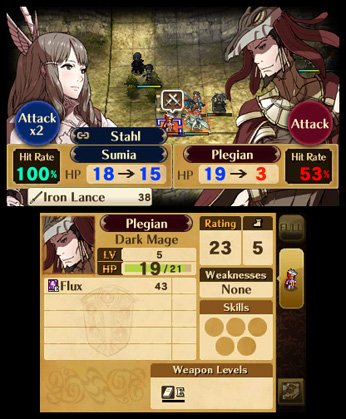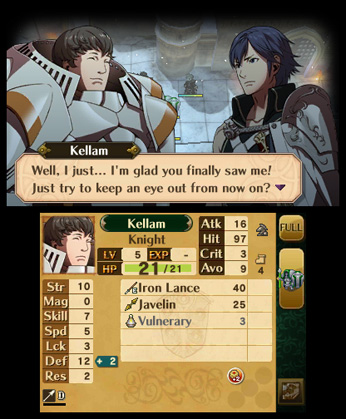Lengthy campaign, extensive cast of characters, humorous support conversations, beautiful soundtrack, deep gameplay
No way to undo moves, threadbare multiplayer mode
A fissure rips through the ground, throwing the calm, nighttime serenity into a fiery panic, trees toppling over with each seismic heave. Just then, a rift opens up in the heavens. In the smoke and confusion, you spot two figures writhing out of the portal, hitting the earth with a lifeless thud. Before you can make sense of the chaos around you, these same figures are shambling toward you on uneasy legs, eyes piercing the darkness with an inhuman glow, axes raised above their heads, noxious breath seeping from their haggard mouths.
This scene marks your first encounter with the zombie-like Risen in Fire Emblem Awakening, the thirteenth installment in Nintendo’s strategy-RPG series. This isn’t the first time that Fire Emblem has flirted with supernatural elements; dragons and pegasi have long been staples of the franchise (as have magic and deities), and 2005’s The Sacred Stones introduced other mythological beasts like cyclopes, gorgons, and centaurs to the mix. But by and large, the series has always been more concerned with human dramas– political intrigue, the looming threat of war, international relations, betrayal. Awakening has all of these, but it wraps them up in a tale spun from decidedly more supernatural threads, with undead warriors making up the primary threat to Ylisse (the halidom around which the game is set) and past heroes inexplicably returning to lend you their strength. It’s clear that Intelligent Systems wanted to stake new territory with its first 3DS Fire Emblem game.
Not that you’d tell just from looking at it. Awakening borrows quite liberally from earlier Fire Emblem titles. You begin by creating your own avatar (a feature borrowed from the Japan-only Heroes of Light and Shadow), defining his or her appearance and choosing a specific stat for your proficiency (and one as a deficiency). From there, the game settles into more familiar RPG territory as you wake up in a field with no recollection of your past and come face to face with Chrom, the protagonist and crown prince of Ylisse, along with his roving band of heroes, the Shepherds. After some brief introductions, you hear a cry for help and rush off to the nearest village, where– in true Fire Emblem fashion– you take part in a tutorial battle against a group of bandits. Your cunning strategy and earnest demeanor are enough to earn you a spot on the Shepherds as a tactician (shades of 2003’s titular installment), and you accompany the group on its journey back to Ylisstol, the capital of the halidom and the target of a vengeful plot by the neighboring Plegia.

As in any Fire Emblem game, the narrative in Awakening is consistently engaging thanks in large part to the phenomenal localization, and is divided up into different chapters that are laid out on a world map a la The Sacred Stones. Each one unfolds like an elaborate game of chess. You’re given command of a small army of soldiers, each with a different movement radius depending on its class– knights, for instance, can only trundle a few steps before settling in place, while pegasus knights can cover large swathes of the battlefield in one swoop and can even soar above mountains and across bodies of water. You’ll have to maneuver these troops carefully around the map, using their innate skills– and some meticulous planning– to defeat the enemy forces and progress through the story.
The gameplay hews very closely to the standard Fire Emblem template, but where Awakening sets itself apart from its predecessors is in the ability to pair two characters up on the battlefield, either by positioning them next to one another or by linking them together via the menu. This adds a satisfying new layer of strategy to the gameplay. Paired characters perform much better in combat than a single unit, gaining a slight stat boost at the start of each encounter. Pair them up often enough and they will begin to attack in tandem, launching upwards of four volleys per round. One of them may even deflect an incoming attack, allowing the other to retaliate without taking any damage. This changes the whole dynamic of combat, encouraging players to pair different characters up as often as possible to maximize their effectiveness and to compensate for each other’s weaknesses.
But perhaps the best thing about this new mechanic is how seamlessly it ties into the series’ most notable feature, the support conversations. One of the things that has always set Fire Emblem apart from other strategy games is its cast of characters. Rather than commanding an army of faceless troops (as is the case in its sister series, Advance Wars), each unit in Fire Emblem has a distinct name and personality. Not only does this make the sting of its other hallmark, the permadeath, all the more potent (though the new Casual mode allows any fallen hero to return unscathed after battle, making the game much more welcoming to newcomers), it gives your team members a chance to forge relationships with one another. Awakening takes this one step further by even allowing certain characters to marry when they attain a high enough support level, their romance humorously blossoming with each conversation until one of them finally proposes. Not only are these conversations a joy to eavesdrop on, they open up additional paralogues to play, expanding the scope of the story and allowing you to recruit each couple’s future children– who typically outclass their parents on the battlefield– onto your team.

As excellent as the gameplay is, however, a few issues do mar the overall experience. There is, to the best of my knowledge, no way to undo a move once you’ve made it, which can be frustrating when you accidentally position a unit in the line of fire. The multiplayer is also fairly sparse, limited to a local co-op battle mode that pits you and a friend (who must also own a copy of the game) against different preset teams. The StreetPass function does remedy this somewhat by allowing you to challenge an AI facsimile of any player you’ve come across in real life, but it’s nevertheless disappointing that you can’t battle your friends over Wi-Fi as you could in Shadow Dragon.
That said, these complaints are trivial in light of the game’s accomplishments. Not only is Fire Emblem Awakening arguably the best installment of the series to date (certainly the best one to make its way stateside), but it is also one of the finest games available for 3DS. The narrative, with its darker supernatural bent, is well-written and engaging, while the ability to pair characters up on the battlefield adds a whole new dimension to the Fire Emblem gameplay, and makes developing relationships between your troops even more enjoyable. Best of all, the new Casual mode opens the series up to those who may have been put off by its characteristic difficulty, ensuring that newcomers and veterans alike will be able to get the same enjoyment out of Awakening’s storyline.




 ShareThis
ShareThis






